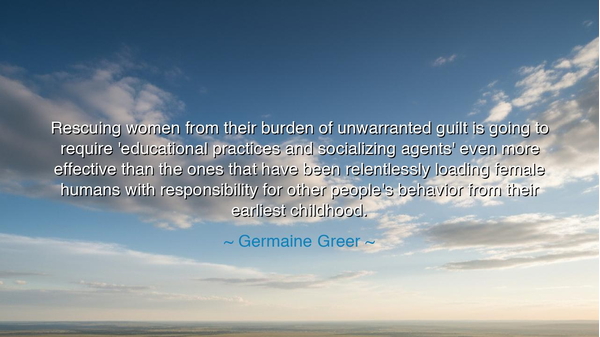
Rescuing women from their burden of unwarranted guilt is going
Rescuing women from their burden of unwarranted guilt is going to require 'educational practices and socializing agents' even more effective than the ones that have been relentlessly loading female humans with responsibility for other people's behavior from their earliest childhood.






The words of Germaine Greer strike like a clarion call against the ancient chains of unwarranted guilt placed upon women. From the earliest days of childhood, society has burdened them with responsibility for the actions, desires, and tempers of others. Greer unmasks this as an injustice so deeply rooted that it can only be undone by forces stronger than those that imposed it—by educational practices and socializing agents powerful enough to rewrite the story of what it means to be female.
For centuries, the tale has been the same. If a man falters, it is said the woman tempted him. If a child errs, it is the mother who is blamed. If a household collapses, the fault is laid at the wife’s feet. Thus, a silent weight is handed down through generations, shaping women not to live freely, but to carry guilt for the deeds of others. Greer’s words name this injustice for what it is: a theft of dignity, a corruption of truth.
History bears witness to this pattern. Consider the story of Eve, told in scripture as the first woman, condemned for leading Adam into sin. For millennia, this tale was wielded as a weapon, teaching girls to see themselves as guilty by nature, destined to bear the blame for men’s failings. From this myth flowed rivers of shame, reinforcing the belief that women must be ever-watchful, ever-sacrificing, ever-responsible—not for themselves alone, but for all around them.
And yet, women have resisted. In the 20th century, voices like Greer’s rose, declaring that this inheritance of guilt must end. The feminist movement, like a river breaking a dam, sought to wash away the false teachings that chained women to silence and shame. Schools, families, and institutions must now become places not of burden but of liberation, teaching daughters that they are not guardians of men’s behavior, but sovereign beings with their own light, their own path, their own responsibility for themselves alone.
Thus, let this wisdom be passed on: to rescue women from their unjust burden, we must not merely unlearn, but re-teach, with greater strength than the voices that once bound them. For freedom does not come by accident—it is forged through truth, nurtured through education, and guarded through courage. And when women are no longer bent beneath the weight of another’s guilt, humanity itself will rise taller, carried by the strength of those who are finally free.






KNtrinh khanh ngoc
Greer’s perspective is eye-opening, but it also makes me think about the wider implications. How do we rewire the education system, media, and family dynamics to stop this cycle of guilt? Is it possible to completely overhaul how we socialize girls without pushing back against certain traditions and values? If we want to protect future generations of women from this emotional burden, what specific practices need to be implemented, and by whom?
B905 Hoang Thanh Binh 9a1
Germaine Greer’s quote raises an important question about how society conditions women to feel responsible for everything, often unfairly. I think we need to ask: what role do men play in this? How do we ensure that both men and women are equally accountable for their actions, and that women aren’t always the ones left carrying the emotional burden? What are the real solutions beyond just changing educational practices?
DTPham Duy Tuan
I agree with Greer’s statement about the unfair guilt placed on women, but I also wonder—how do we start to undo this ingrained mindset? It feels like educational practices and socializing agents need to be redefined, but are we truly preparing the next generation of girls to reject this sense of unnecessary responsibility? How can we foster an environment where women aren’t taught to feel guilty for things outside their control from an early age?
NDta ngoc dung
Greer’s point about rescuing women from unwarranted guilt resonates with me, especially considering how women are often socialized to take responsibility for everything around them. But I wonder, is it realistic to expect a single societal shift to undo centuries of this mindset? Can changes in education and socializing agents truly dismantle these deeply rooted norms, or will it take longer for these shifts to fully take hold in society?
HNVi Thi Hong Nhung
Germaine Greer’s quote highlights a crucial issue—how society often places the burden of guilt on women for actions that aren’t theirs to carry. I wonder, though, how deeply ingrained this cultural expectation is. Is it enough to simply change educational practices, or do we need a complete cultural shift to break free from the narrative that women are responsible for others’ behavior? How do we begin to challenge this from a young age?